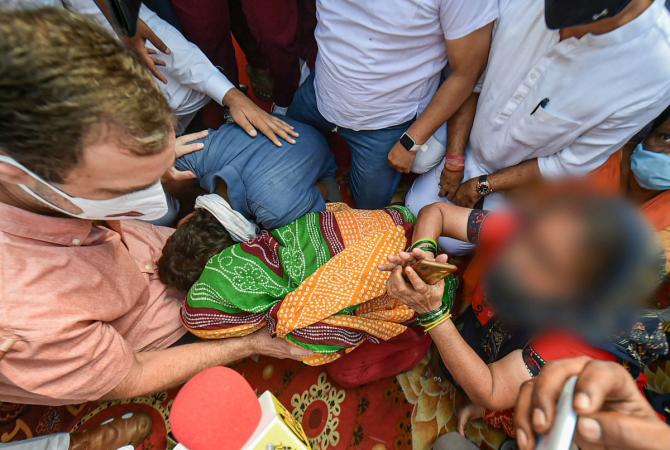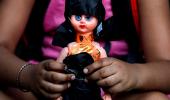'Our senselessness on caste issue has gone so deep that we need to have a sensitivity test on why we as Indians have become so numb to such mindless violence.'

Dr Suraj Yengde is the author of the critically acclaimed book Caste Matters and the award-winning anthology The Radical in Ambedkar: Critical Reflections.
An eminent Dalit scholar of caste, Senior Fellow at Harvard Kennedy School and a post-doctoral fellow at the Initiative for Institutional Anti-racism and Accountability at Harvard University, Dr Yengde spoke with Prasanna D Zore/Rediff.com last October about how India's Dalits can assert their social, political and economic rights.
"It's not the onus of the Dalits only to fight for the rights of Dalit women. It should be the responsibility of every woman, every citizen of the country who believes in the Indian Constitution, who believes in the rule of law," Dr Yengde said from Boston. An interview that has renewed resonance after the reported gangrape and murder of a 9-year-old Dalit child in Delhi this past week.
The first of a multi-part interview:
What does the Hathras gangrape tell you about modern India?
When you ask about modern India, in India, incidents like these () and existence of caste (violence) in our society reveals that our society has never been modern.
In India we are still living in an ancient to medieval era society. The modernity that we often talk about has never been such.
We have co-opted the magnitude of modernity, the logos of modernity, the language of modernity, the fashion, the style, even the cuisine and culture of modernity. And in this sense, modernity here (in India) simply reflects what Western modernity means.
In Indian context, what we have done is we have, as Indians always do, they will go half way, they will not go full way, which means, they will only accept (Dalits) up to the extent of fulfilling their casteist desires.
You go in any field, it's not just the violence against women, you talk about anything; you won't see a complete acknowledgement or, acceptance of this (casteist discrimination). Hathras is one (manifestation) of many (such) incidents, as it was reported (widely in the media), and because one political party took an interest in this, and, that's why it (the furore over the gangrape) came about.
But what about many other incidents (like Hathras) that, you and I sitting on our desks would barely even notice?
Just the other day (after the death of the Hathras victim on September 29, 2020), another Dalit woman was raped and trashed in UP.
Now, the rape incidents are slightly reported. Why? Here's the logic.
The entire structure is meant to assuage (the guilt of) the elite, the dominant castes, the dominant gender of our society.
And when I say it's a slight reporting (of rapes of women or of Dalit women), by this, what I meant to say is, let's say something happens with you, or God forbid, some member of your family, who is a female, and she wants to go and complain about it at a police station. Now, we have so many strict laws that protect women; like eve-teasing could also be a crime. But tell me how the police play down such crimes?
What we have is that even a normal, urban-living, woman of dominant caste goes to file a complaint she will face difficulties. Now multiply that (difficulty level) six to seven times -- six to seven times because of the layers of subordination and disadvantage -- when a Dalit woman goes to file a complaint in the police station compared to a non-Dalit.
That's the kind of incidents we see when it comes to reporting of cases (of atrocities against women and more so against Dalit women). What we are seeing is heavy under-reporting (of atrocities against Dalits). So, the way they did it in Hathras is certainly not unique to the way we present ourselves into this demographic.
What prevents the Dalits from uniting politically even when they form a huge Indian demographic?
What happens is we ask wrong questions and I'll explain how it is wrong.
The point is: It's not the onus of the Dalits only to fight for the rights of Dalit women. It should be the responsibility of every woman, every citizen of the country who believes in the Indian Constitution, who believes in the rule of law.
If a Dalit woman is raped today doesn't mean that a non-Dalit woman is not going to be raped (sometime later). At the end of the day, it is the rape of a woman.
I would like to make a distinction for a Dalit rape because the impunity that the perpetrators of such acts always enjoy. The fact also is that women belonging to dominant castes also get raped, but the difference is when dominant caste women get raped the structural (institutional) system is there to support her. We have seen this time and again.
Do you think that the rape of a Dalit woman doesn't roil the conscience of the nation as much as the rape of a woman belonging to the dominant castes?
That, my friend, is the template of India's Dalit situation. We don't even have to go further.
Our senselessness on caste issue has gone so deep that we need to have a sensitivity test on why we as Indians have become so numb to such mindless violence.
And believe me, the people oppressed by caste are more than 30 per cent of India's population. So the people who are opinion-makers, twitter-trollers or Instagram-influencers are this kind of people who belong to the strata that will say Thakurs or Rajputs or upper caste people can never do what happened at Hathras.
It's (the reality) in every village. The point I am making is that dominant castes hold political, social, economic sway in large parts of India.
I would have appreciated if the UP police had built a solid case to nail the culprits of the (Hathras gangrape) victim, but I don't see nothing of this sort happening even when the case is with the CBI.
Tell me, what face does the country have now?
And that's where one wonders again why can't the Dalits unite as a political force?
Why can't they assert themselves for their political, economic, social rights?
What prevents the Dalits from doing this?
I know where you're coming from. And when the Hathras gangrape happened, you can see Dalits across the caste, across the groups are there. People are protesting and they are uniting; the Dalits are uniting.
We just don't see it because we are used to seeing the unity of sharing the stage, giving supportive statements and the kind of unity that is born out of this is electoral unity. Dalits have their unique fights.
Dalits stand together -- be it for preventing the dilution of Dalit Atrocity Act (The Scheduled Castes and Tribes (Prevention of Atrocities) Act, 1989), or the Bhima Koregaon instance. But we have to recognise that it is not only upon Dalits, but also upon the non-Dalits and dominant castes to pay attention to this (kind of gender and caste violence).
I want the dominant castes to put their empathy cap on. Suppose you belong to one of the dominant castes by the virtue of which you have certain privileges, and we need to call upon these people who are willing to go that extra mile for the welfare and rights of Dalits.
Let all the youngsters who believe in India's Constitution single out all the aggressors who believe in inflicting atrocities upon Dalits; who don't consider Dalits as an equal citizen. We need accountability at an individual level.











 © 2025
© 2025